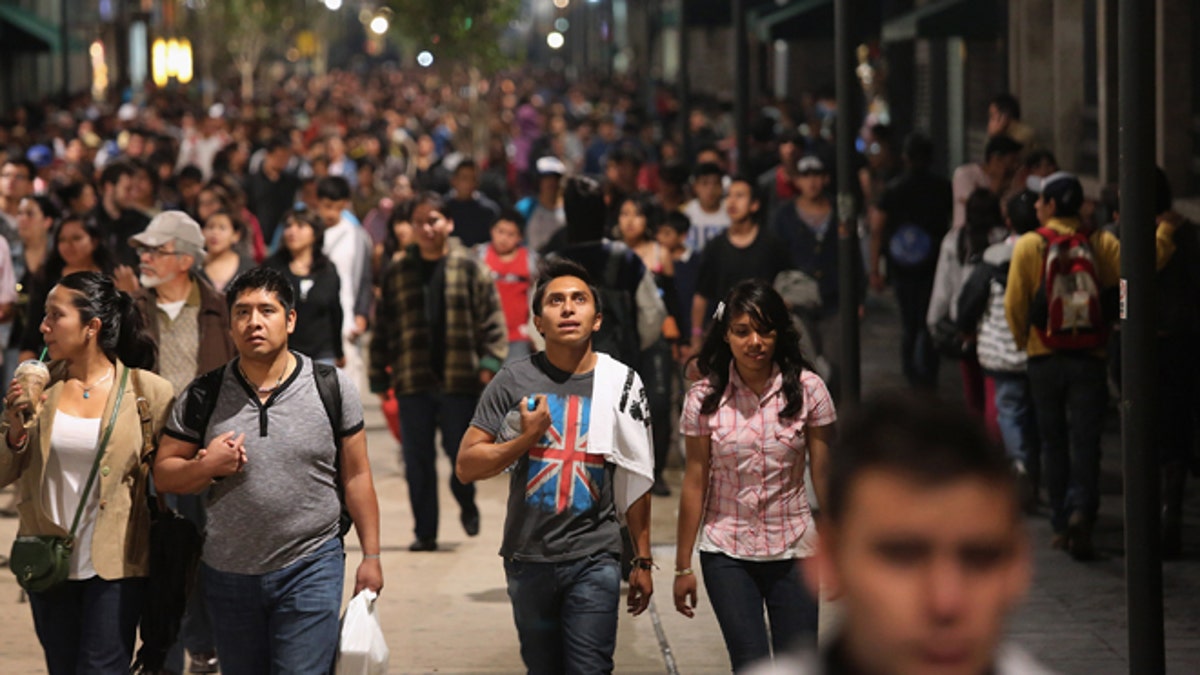
MEXICO CITY, MEXICO - JUNE 23: Mexican youth walk home after a political demonstration in Mexico City's zocalo square on June 23, 2012 in Mexico City, Mexico. Thousands of Mexican youth, most supporters of leftist presidential candidate Andres Manuel Lopez Obrador, have been demonstrating for a fair electoral process ahead of the July 1 presidential election. Lopez Obrador lost the last presidential election in 2006 by a small margin and never accepted the result, citing fraud. (Photo by John Moore/Getty Images) (2012 Getty Images)
I recently had the opportunity to visit with officials from Mexico’s new administration for some extremely insightful talks on border trade and security. I walked away impressed. Our neighbors to the south are open for business. But not just that, they are open for suggestions!
Since the election of Mexico’s new president, I have continued to work with the transitional teams and our meetings have been met with openness and professionalism from day one.
The tone of the recent meetings was no different; frank and direct with a clear spirit of cooperation, not combativeness. This is an administration that fully understands that, as Asia’s position as a desirable manufacturing location begins to slip due to rising labor and transportation costs, Mexico is primed to seize an opportunity for real job growth and help elevate the economies of its NAFTA partners, Canada and United States.
I was especially encouraged by Aduanas’ desire to get creative in finding ways to more efficiently move low-risk freight through ports of entry.
Mexico’s customs agency, Aduana México, will see a new commissioner named later this month. It will be up to that official to determine whether any of the previous administration’s appointees will be retained. However, despite this transition period, the positive, forward-thinking tenor of new President Enrique Peña Nieto’s outlook toward international trade has been set.
In the border infrastructure arena, three major land port projects have already been identified as priorities with the promise of future trade and travel-facilitating projects to solicit input from the U.S. Customs and Border Protection and border users.
I was especially encouraged by Aduanas’ desire to get creative in finding ways to more efficiently move low-risk freight through ports of entry. The agency has embraced the possibilities offered by coordinated pre-inspection operations conducted by CBP officers on Mexican soil in a secure location. Already on the drawing boards are projects slated for Laredo, Texas; Otay Mesa, California; and Santa Teresa, New Mexico. Agency officials hope to have the official unveiling of the first-fully functional project off the ground within 60 days.
Of interest to trade practitioners, those in the weeds of complying with the reams of rules and regulations that govern international commerce, Mexico is committed to cutting down on duplicative and redundant processes and is supportive of the concept of ventanilla única, or a single window for data entry accessible by agencies in both the U.S. and Mexico. Unfortunately, the report our delegation received indicated that the foot-dragging to bring such a system fully online is occurring in the U.S.
At our request, Mexico has agreed to put a private-sector working group together what will help work the kinks out of its trusted shipper program, NEEC, or el Nuevo Esquema de Empresas Certificadas. In the U.S. we have C-TPAT, or the Customs-Trade Partnership Against Terrorism, but the concept behind the programs in each country is largely the same: share information about who you’re doing business with in your supply chain and, in exchange, you’ll receive expedited service and crossing times through the port inspection process.
Critical to these programs’ success is increased participation and mutual recognition, whereby each country can be satisfied with the security standards established in the neighboring country. Unfortunately, NEEC has experienced a rough launch, with few companies joining and others expressing concern over the amount and type of information they’re being asked to share with the Mexican government. We have the commitment from the Undersecretary’s chief of staff that a full review of NEEC would commence with seats at the table for the trade community and CBP.
While the program might be something only logistics professionals interact with, the Mexican government’s desire to carry out improvements has broader implications. This is the Institutional Revolutionary Party’s (Partido Revolucionario Institucional), or PRI’s, first time back in power in 12 years. Its previous administrations were characterized by corruption and graft, not engagement with global business. That its liaison agency to international commerce is putting its best foot forward bodes well for a stronger U.S.-Mexico trade relationship that ultimately leads to more jobs, more travel, and safer borders.




















